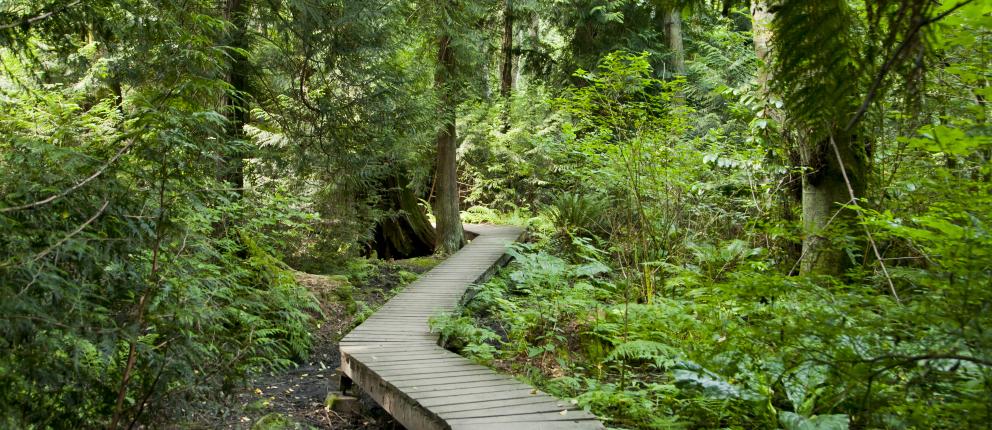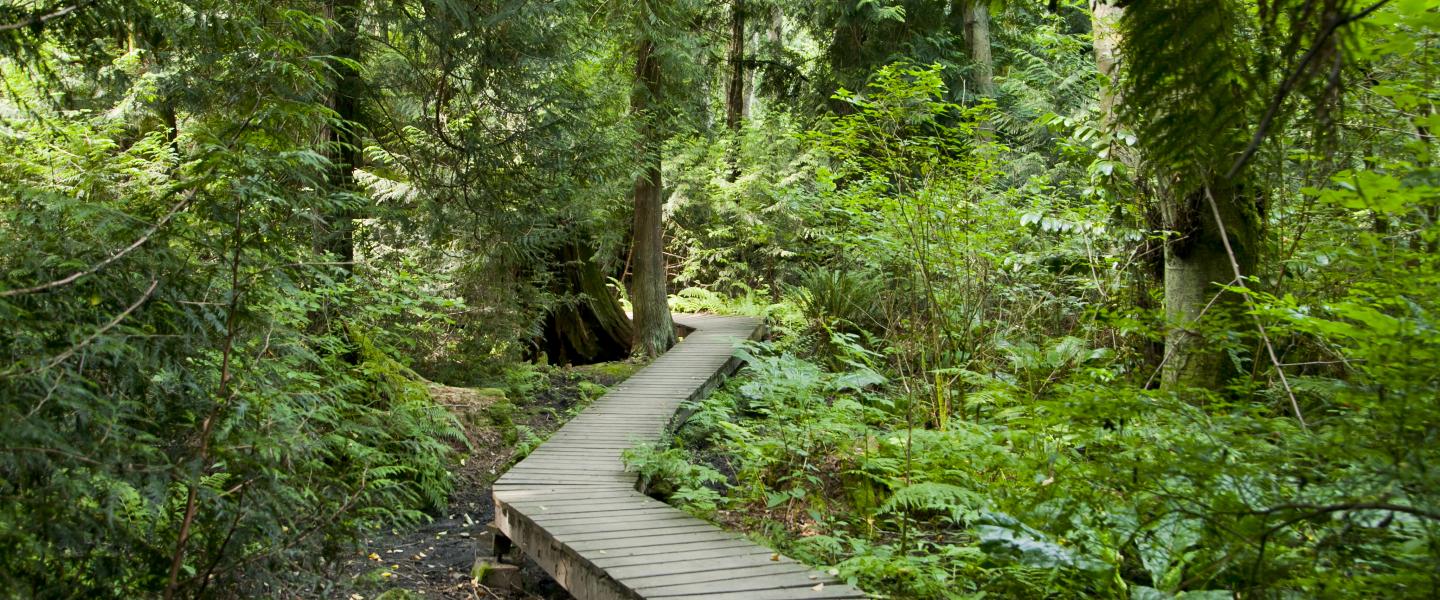Sacred Seeds Trail Info
The Sacred Seeds Ethnobotanical Trail is part of an international network of gardens co-created by Tom Newmark (New Chapter Herbs) and Rafael Ocampo (Costa Rican plant scholar) to address the rapid loss of biodiversity and plant cultural knowledge. Their vision was to build collaborative gardens all over the world that act as “living libraries” and seed banks for local ethnomedicine plants—bringing together botanists, indigenous peoples, herbalists and schools. The Sacred Seeds project is now a part of United Plant Savers.
Bastyr was one of the first to become a sanctuary site beyond Costa Rica in 2011. The ¾-mile-long Sacred Seeds Trail at our Kenmore campus encompasses three Salish Sea bioregions (camas prairie, lowland forest and wetlands/bog) and both preserves and educates about plants native to the Salish Sea. It also includes the Greenhouse completed in June 2017—funded in part by local tribal nations with the intent of the space being available for their own Tribal or public workshops. Our Trail is located on Duwamish, Snohomish and Muckleshoot territories.
Bastyr’s garden team offers community education on the Sacred Seeds Trail through ethnobotanical field trips for K-12 students. We work closely with the Tend, Gather & Grow team at GRuB to teach their unique curriculum—designed by a team of indigenous and settler-descendent plant scholars to revitalize wild edible and medicinal plant knowledge for Native and regional communities.
Thanks to generous grant funding, Bastyr is able to offer educational opportunities free of charge for students at Tribal and Title I schools.
Self-Lead Learning with Storymaps
Ethnobotany Adventures can take two forms: Video Field Trips and Written Lesson plans that can be turned into self-led adventures.
Thanks to generous grant funding, Bastyr was able to offer educational opportunities free of charge for students at Tribal and Title I schools.
Ethnobotany Adventures can take two forms: Video Field Trips and Written Lesson plans that can be turned into self-led adventures.
‘Ethnobotany Adventures’ Written Curriculum
Here you can find free "Ethnobotany Adventures” for your students, including classroom activities, writing prompts, and more! The curriculum can be adjusted for a wide range of age groups from K-12.
Visit our YouTube page for educational videos surrounding the Sacred Seeds Trail. Topics include ecosystems, plant profiles, seed saving, ethnobotany, reciprocity and more.
Sacred Seeds Ethnobotanical Trail
Tour the plants on the Sacred Seed Ethnobotanical Trail either in-person or virtually using the the Sacred Seeds Storymap page, where forest and prairie plants are pictured throughout the seasons.
Land Map
Use this digital map as a guide for Territory Acknowledgment, and to foster conversation about the history of colonialism and Indigenous ways of knowing. This map is a project by Native Land Digital, a Canadian, indigenous non-profit.
Land Acknowledgement
After using the map above to find traditional stewards of the land, students and teachers can offer respect for these stewards with a land acknowledgment. This is not a replacement for action, but is an important start toward growing a reciprocal relationship with the land we are on and those who have stewarded it since time immemorial. Check out these acknowledgements from the Duwamish Tribe and Puyallup Tribe.
Lushootseed/Twulshootseed Language
In honoring the original stewards of the land, raising up the original language of the land we’re on is just as important to coming into right relationship with the medicine and stories of the plants. Lushootseed and Twulshootseed are the primary Coast Salish languages of the land here at Bastyr. Learn more about Lushootseed through the Tulalip Lushootseed Department, and about Twulshootseed through the Puyallup Tribal Language Department.
Real Rent Duwamish
The Duwamish Tribe, traditional stewards of this land and much of the Seattle area, are still not federally or locally recognized as a Tribal Nation. Learn more by watching the documentary film ‘Promised Land’. One way to support is to make a monthly financial contribution to the Duwamish Tribe. Visit Real Rent Duwamish to learn more.
We are honored to have had an Advisory Committee steer the Sacred Seeds Project at Bastyr. Our Advisory Committee included Michael Evans (Snohomish), Sheila McCoy Hillaire (Tulalip) and Valerie Segrest (Muckleshoot). Please email [email protected] to find out more.
Visit Basty'rs Sacred Seeds Portal here! During the Covid pandemic, Bastyr University Gardens brainstormed how it could make the Sacred Seed's Ethnobotanical Trail and educational content more accessible.
We decided to create a dynamic webpage that featured seasonal plant photos and interactive tours, enhance on-site and classroom experiences, and create the opportunity to ‘tour’ the trail virtually now as well. We invite feedback and participation in this work in progress.

